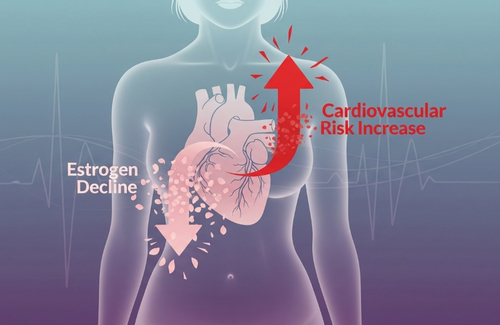Menopause marks a natural phase in a woman’s life, typically occurring between the ages of 45 and 55, when menstrual cycles permanently cease. While it signifies the end of the reproductive years, menopause also brings profound hormonal shifts that can significantly impact long-term health. Among the most concerning changes is the heightened risk of cardiovascular disease (CVD), the leading cause of death among women worldwide. Understanding why this risk increases post-menopause and adopting preventive strategies is vital for safeguarding heart health during this transition.
The Link Between Menopause and Heart Health
Hormonal Shifts and Estrogen’s Role
Estrogen, the primary female sex hormone, plays a protective role in heart health. It helps maintain flexible blood vessels, regulates cholesterol levels, and supports healthy blood flow. During menopause, estrogen levels decline sharply, leading to changes that increase heart disease risk:
- Stiffer arteries: Reduced estrogen causes a loss of elasticity in blood vessels, which can raise blood pressure.
- Worsening cholesterol profile: LDL (“bad” cholesterol) often rises, while HDL (“good” cholesterol) may decline.
- Increased fat distribution: Menopause often shifts fat storage from the hips and thighs to the abdomen, a pattern closely linked to higher cardiovascular risk.
Alongside hormonal changes, other age-related factors intensify the threat:
- Metabolic slowdown: A reduced metabolism can lead to weight gain, which strains the heart.
- Insulin resistance: The risk of developing type 2 diabetes increases, further complicating heart health.
- Sleep disturbances and hot flashes: Poor sleep quality and stress during menopause can elevate blood pressure.
Also Read: Movement for Heart Health: Exercise Routines for Women
Common Cardiovascular Risks After Menopause
- Hypertension (High Blood Pressure): Without estrogen’s protective effect, women are more likely to develop high blood pressure in midlife, a leading risk factor for heart attack and stroke.
- Atherosclerosis: The buildup of blockages in arteries accelerates, raising the chances of coronary artery disease, which can lead to heart attacks.
- Obesity and Metabolic Syndrome: Weight gain around the abdomen is common and often accompanies increased triglycerides, high blood sugar, and high LDL cholesterol.
- Type 2 Diabetes: Post-menopausal women have a greater risk of diabetes, which significantly increases heart complications.

Heart disease symptoms often present differently in women than in men, leading to misdiagnosis or delayed treatment. Women may not always experience the “classic” crushing chest pain. Instead, they may notice:
- Unusual fatigue and dizziness
- Shortness of breath
- Pain in the neck, jaw, or between shoulder blades
- Chest discomfort rather than sharp pain
Awareness of these subtle symptoms is crucial, as early medical intervention can save lives.
While menopause does increase cardiovascular risk, proactive lifestyle choices and medical guidance can significantly lower the chances of developing heart disease.
1. Prioritize a Heart-Healthy Diet
Nutrition is one of the most powerful tools for protecting heart health:
- Focus on plant-based foods: Fruits, vegetables, legumes, nuts, and whole grains provide antioxidants and fiber.
- Choose healthy fats: Incorporate omega-3 fatty acids from sources like fish and nuts. Replace saturated fats with white oil.
- Limit added sugars and processed foods: These contribute to weight gain, insulin resistance, and high triglycerides.
- Avoid extra salt, pickles, fast foods with preservatives, and fizzy drinks.

2. Maintain Regular Physical Activity
Exercise helps regulate weight, improve heart health, and reduce stress. Aim for:
- 150 minutes of moderate aerobic activity weekly (brisk walking, cycling, swimming).
- Strength training twice a week to preserve muscle mass and improve metabolism.
- Flexibility and balance exercises like yoga or meditation for overall well-being.
3. Manage Weight and Abdominal Fat
Post-menopausal belly fat is especially risky for cardiovascular health. Combining a healthy diet with regular exercise is the most effective strategy. Even modest weight loss can lower blood pressure, improve cholesterol, and reduce diabetes risk.
4. Quit Smoking and Limit Alcohol
Smoking damages blood vessels and accelerates the blockage of arteries in the heart. Quitting is one of the most important steps for heart health. Alcohol consumption should be limited, as excessive intake raises blood pressure and triglycerides.
5. Monitor Blood Pressure, Cholesterol, and Blood Sugar
Regular checkups are vital after menopause:
- Blood pressure: Keep it below 120/70 mmHg, if possible.
- Cholesterol levels: Manage LDL, HDL, and triglycerides with lifestyle changes or medication if needed.
- Blood sugar: Routine testing can catch prediabetes early.
6. Stress Management and Sleep
Menopausal symptoms like hot flashes, mood swings, and sleeplessness can increase stress and affect heart health. Strategies include:
- Mindfulness meditation and breathing exercises
- Creating a calming bedtime routine to improve sleep quality.
- Seeking professional counseling help if anxiety or depression is present.
7. Consider Hormone Therapy Carefully
Hormone replacement therapy (HRT) can help with severe menopausal symptoms, but its role in heart health is complex. Some studies suggest it may reduce risk if started early in menopause, while others warn of increased risks if begun later. Decisions about HRT should always be made in consultation with a medical professional, weighing individual risk factors such as family history and existing conditions.
Partnering with Healthcare Providers
Menopause is a turning point for many women to reassess their health priorities. Regular discussions with healthcare providers about cardiovascular risk, lifestyle strategies, and preventive screenings are crucial. In addition to annual checkups, women should ask about:
- Heart disease risk assessments.
- Screening for diabetes and high cholesterol.
- Personalized exercise and dietary guidance.
- Safe options for managing menopausal symptoms.
Menopause is not simply the end of fertility—it is a transformative stage that reshapes women’s health in many ways, particularly the heart. The drop in estrogen brings increased vulnerability to hypertension, diabetes, obesity, and heart disease. Yet, this stage also presents a powerful opportunity: by adopting heart-healthy habits, staying active, and working closely with healthcare providers, women can take control of their heart health and thrive well beyond menopause. Navigating this transition with awareness and proactive care ensures that the years after menopause are not only longer but also healthier and more fulfilling.



